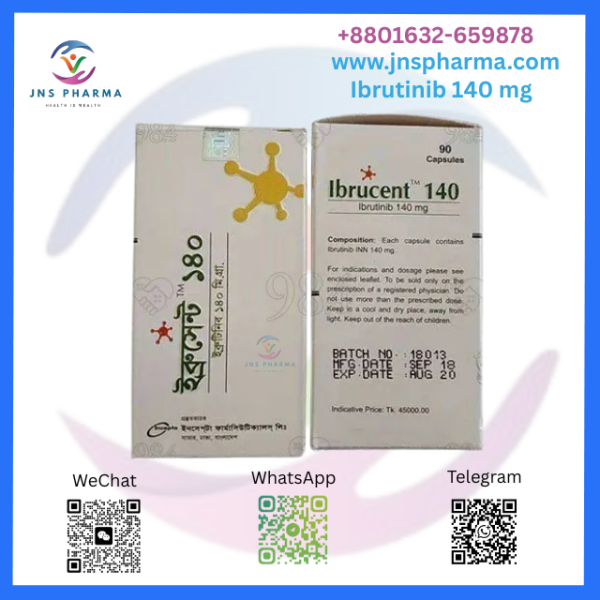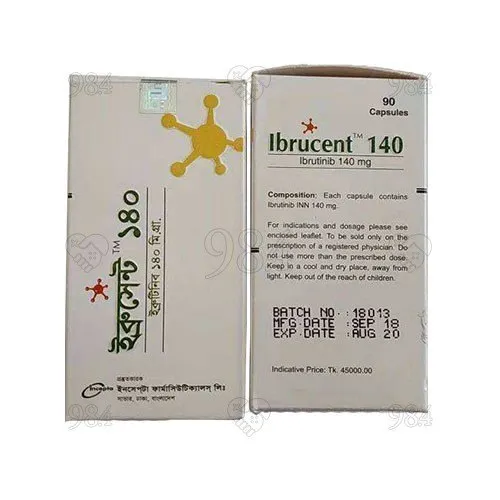Don't miss our holiday offer - up to 50% OFF!
Ibrucent 140 mg (Ibrutinib)
Ibrucent 140 mg, containing the active ingredient Ibrutinib, is a potent and targeted medication primarily used in the treatment of various types of cancer, particularly hematologic (blood-related) malignancies. As an oral Bruton’s Tyrosine Kinase (BTK) inhibitor, Ibrucent plays a critical role in the management of chronic lymphocytic leukemia (CLL), mantle cell lymphoma (MCL), Waldenström’s macroglobulinemia (WM), and other B-cell malignancies. Its ability to interfere with specific signaling pathways crucial for the survival and proliferation of malignant B-cells makes it a game-changer in modern oncology.
Mechanism of Action
Ibrutinib, the active compound in Ibrucent 140 mg, works by selectively inhibiting Bruton’s Tyrosine Kinase (BTK), an enzyme critical in B-cell receptor signaling. By binding to BTK, Ibrutinib prevents the downstream signaling required for B-cell development and activation. This blockade impedes the proliferation and survival of abnormal B-cells that drive certain cancers. The inhibition of BTK reduces the growth and spread of malignant cells. Effectively slowing down the progression of B-cell malignancies like CLL and MCL. In turn, it helps to mitigate the adverse effects associated with the uncontrolled proliferation of these cells.
Indications and Uses
Ibrucent 140 mg is approved for the treatment of several conditions related to B-cell malignancies, including:
Chronic Lymphocytic Leukemia (CLL): A slow-growing cancer of the blood and bone marrow that leads to an overproduction of abnormal lymphocytes (a type of white blood cell). Ibrucent helps to control disease progression and reduce symptoms in patients, particularly those who have relapsed or are refractory to prior treatments.
Mantle Cell Lymphoma (MCL): An aggressive form of non-Hodgkin’s lymphoma characterized by the uncontrolled growth of mantle zone B-cells. Ibrucent is used to treat patients with MCL who have received at least one prior therapy, providing an effective alternative to traditional chemotherapy regimens.
Waldenström’s Macroglobulinemia (WM): A rare type of non-Hodgkin lymphoma involving the overproduction of immunoglobulin M (IgM) antibodies. Ibrucent significantly improves the prognosis of patients with WM by inhibiting the malignant B-cells that produce the abnormal IgM.
Other B-cell related malignancies: Ibrucent is also used in the treatment of other cancers involving B-cells, including certain forms of lymphoma, where traditional therapies may not be as effective.
Dosage and Administration
Ibrucent 140 mg is typically administered as a once-daily oral tablet. The exact dosage may vary depending on the type of cancer being treated, the patient’s overall health. How they respond to the treatment. It is essential that patients adhere to the prescribed dosing schedule to maximize therapeutic outcomes. The tablet should be swallowed whole, with or without food, and it should not be split, chewed, or crushed.
Side Effects and Considerations
As with any medication, Ibrucent 140 mg can cause side effects, though not everyone experiences them. Common side effects include diarrhea, fatigue, nausea, and low blood counts (such as neutropenia or thrombocytopenia). More serious side effects may include bleeding events (e.g., bruising, nosebleeds, or more severe hemorrhages). Infections, and an increased risk of heart arrhythmias. Due to its mechanism of action, patients taking Ibrucent may also have a higher risk of developing infections. As the immune response is affected by the drug’s impact on B-cells.
Patients must inform their healthcare providers of any other medications they are taking, particularly blood thinners or medications that affect heart rhythm. As these could interact with Ibrucent and increase the risk of adverse effects.
Conclusion
Ibrucent 140 mg is a breakthrough therapy that has transformed the treatment landscape for B-cell malignancies. Its ability to selectively target BTK allows for a highly effective treatment approach. With less damage to healthy cells compared to conventional chemotherapy. However, due to its potential side effects and the complexity of treating blood cancers. It is crucial that patients receiving Ibrucent do so under the careful guidance of a medical professional. This medication offers hope and improved outcomes for many patients who have exhausted other treatment options, providing a valuable tool in the fight against certain blood cancers.










Reviews
There are no reviews yet.